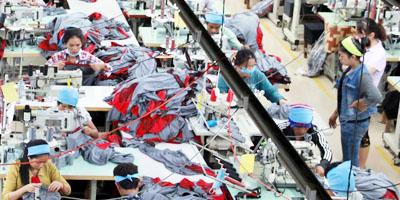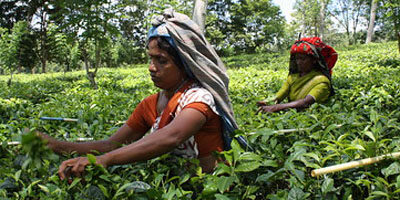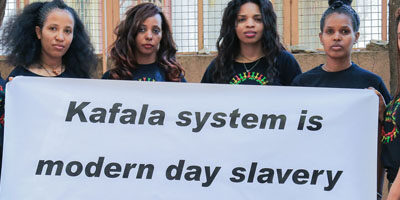Click here to listen to the companion podcast
Speaking to me on his mobile phone via Zoom, Ath Thorn, president of the Coalition of Cambodian Apparel Workers Democratic Union (CCAWDU) recalled his experience during the countrywide 2013-14 protests. Despite cutting out every so often, his voice was passionate as he told me, “Because more people joined, the government became scared and led a very strong crackdown on workers. More than twenty-eight people were in jail – including me – and five people were killed and many left missing.”
Thorn, along with five other union leaders, was given a two-and-a-half year suspended sentence and ordered to pay compensation of 35 million riel (US$8,750) for allegedly instigating violence.
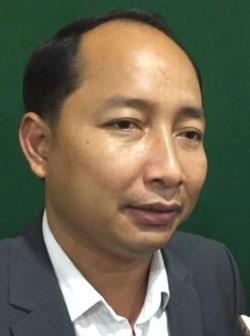
Looking back now, the 2013-14 protests appear as a pivotal turning point in the trajectory of workers’ rights in the country. On the one hand, the voice of the Cambodian worker had never been more pronounced in its unity and clarity. On the other hand, the iron fist with which the government responded to those protests ushered in a decade of repression towards workers that stripped them of this solidarity and made them vulnerable to multiple forms of abuse and discrimination.
Freedom of expression is now vanishingly elusive in Cambodia. With incumbent Prime Minister Hun Sen’s ‘landslide’ election victory in July, after the disqualification of the opposition party in May, this has never been clearer. Through the words of those involved, this is the story and voice of Cambodian garment workers and the multi-layered structure of repression in which they have become ensnared..
Opening the Door: The Garment Economy in Cambodia

“The most important thing to remember is that garment production always chases price,” said Jill Tucker, a labour rights advocate who led the International Labour Organization’s “Better Factories Cambodia” campaign between 2011-2014. “It always has, it always will.” Whilst working conditions may be a factor in the decision-making process of a garment company, Tucker argues that these concerns will always be trumped by considerations involving price.
In the 1990s, triggered by the United Nations’ transitional justice campaign in the country, Cambodia opened up to private investment and the garment industry arrived in the country. Ravaged by the legacy of conflict and the genocidal campaign of Pol Pot’s Khmer Rouge regime, Cambodia immediately benefited from the garment industry.
Economically, the industry accounts for roughly 80% of Cambodian exports. More importantly, according to Cambodian human rights activist and public intellectual Ou Virak, the garment industry generates an influx of much-needed foreign currencies from abroad. The US dollar in particular has facilitated the import of foreign machinery such as automobiles, tractors, and household amenities which have supported socioeconomic development in Cambodia.

In a bright tone, Virak said that the industry “has been amazing in lifting millions of Cambodians out of poverty and dramatically changing the demographic landscape by moving people from agriculture to wage work which, while low, is significantly higher than agriculture.” His high praise of the garment industry’s early years seemed remarkable to me given the well-documented human rights violations which have become increasingly prolific in the industry in recent years.
This demographic shift produced a greater collective awareness of rights, Tucker said. “In the mid-1990s, many workers didn’t really understand that they had rights. They were coming from distant villages to a factory and they were sending money home. They weren’t really focussing on rights. Whereas when the garment industry develops in a country, for various reasons – for NGO work, for the ILO, for brands who have compliance programmes – people start talking about rights.”
While factory floors did not suddenly become engulfed by discussion of rights and revolutions, there was a gradual awareness that had the potential to develop into a united labour movement. “During the 2000s, more workers were starting to organise unions, especially garment workers,” Ath Thorn told me. “After 2001-2002, labour unions grew – especially independent unions.” The escalation in union activity over the mid-2000s was met with some cooperation from the government at the time, which was reaping the economic rewards of the industry, and led to improved minimum wage as well as a heightened awareness of working conditions.
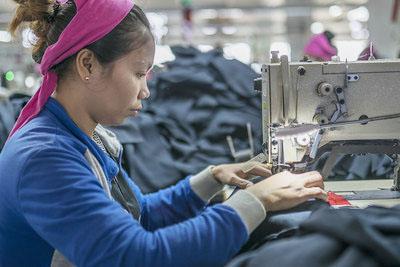
But activism did not come without risks, Thorn told me. “In 2010, when I went on strike with the CLC (Cambodian Labour Confederation)/CCAWDU group, 732 companies filed criminal cases and complaints against us.” Although the unions’ demands were eventually met and the charges dropped, this episode gave a glimpse into the troubling fate of unions and the workers that they represent. The consternation in Thorn’s voice hinted that the rose-tint would soon fade. And so it did.
Locking the Door: Backlash
In December 2013, around ten thousand people took to the streets of Phnom Penh demanding a new minimum wage and changes to the political regime, including the removal of Prime Minister Hun Sen who has ruled the country since 1985. The protesters, led by the Cambodian National Rescue Party (CNRP), were comprised of workers and unions from the garment industry, as well as various other sectors of civil society such as teachers, students, and religious groups.
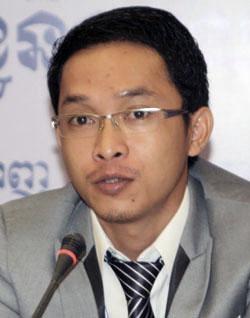
Whilst officially a democracy, Cambodians do not enjoy free and fair elections. Political opponents are often prosecuted or violently intimidated. Cambodian human rights lawyer Piseth Duch told me that, over recent years, “Activists, political opponents, and journalists have been the subject of judicial harassment and conviction because of the political voice against certain government policies.”
Thus, clinging to power in the face of mass social and political dissent, the ruling party responded violently in 2013-14. As Thorn indicated, clashes between protestors and the police led to the five deaths, dozens of injuries, and an unknown amount of disappearances. In a country that seemingly developed faster economically than it had democratically, the prospect of a mass labour movement struck fear into the authoritarian government. As such, the moment that the voice of the Cambodian worker reached fever pitch was also the precursor to an escalation of highly repressive measures.
“We’ve seen, for example, not just prosecutions of union activists but also one of the leading union leaders was assassinated on the street many years ago,” Virak told me. While public displays of violence have reduced with the increasing presence of compliance programmes and non-governmental organisations (NGOs) in the country, other forms of state violence have increased. A prominent example of this is judicial harassment.
Duch told me that “In the past, union leaders were killed or violently abused. But in recent times tactics have shifted to the use of the judicial system.” Companies use judicial provisions to discriminate against workers who attempt to join or form a union. Even peaceful protests have become subject to persecution. “In a very obvious case, regarding the Nagaworld Union which is in the hospitality sector, one of the union leaders remains in prison,” Duch said. “They were convicted of incitement. I think she was jailed for two years.” The union leader Duch referred to is Chhim Sithar, who was given a two-year sentence by a Phnom Penh court in May 2023 for alleged ‘incitement to commit a felony or disturb social security.’
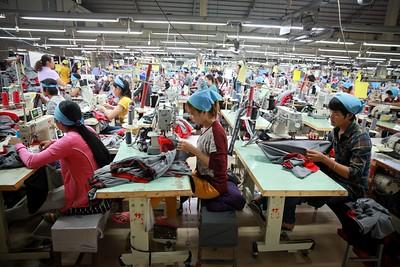
The Law on Trade Union (2016) was foundational to the architecture of judicial harassment. The legislation outlawed all unions which were not registered with the ruling party, robbing workers of the independent political platform which they had steadily built since the arrival of the garment industry in Cambodia. This meant that independent unions were no longer legally recognised as representatives of the workers and therefore had their complaints ignored. The only unions which survived the Law on Trade Union were those registered with the ruling party – colloquially referred to as ‘Instant Noodle Unions’ for their quick and easy registration process designed to appeal to workers.
“It is widely reported by Transparency International and other international organisations that the judiciary is one of the corrupt bodies,” Duch explained. “If those reports are true, it’s really difficult for poor people and workers to get access to justice if they have any disputes or moral violations that they should bring to the court. The government or authorities do not appear to address the disputes of labour rights in accordance with the law. Sometimes they appear to be in the position of favouring corporate or companies, instead of trying to sort out the disputes peacefully.”
According to Virak, these measures and acts of violence are imposed by companies and the judiciary to instil a sense of fear to fragment the workforce and prevent unity. “There’s a lot of distrust among unions and other sectors, and also among unions themselves,” he said. “I think this has the end goal of creating distrust amongst union members, so that there is a level of fear amongst themselves making solidarity very difficult.”
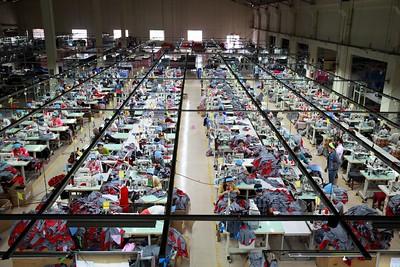
The government has sought to deepen these divides by accusing unions of not having the workers best interest in mind. “One of the justifications of this legal harassment has been that unions are acting selfishly or doing it on behalf of a foreign government to incite instability and overthrow the ruling party,” Virak said.
Stripped of their voice, garment workers became vulnerable to abuse and discrimination.
Factory-Level Abuse
Expecting to hear an age-old story, I asked Ou Virak whether he felt that companies and the government were complicit in repressing workers’ rights in a joint effort to maximise profit. His response revealed a more complex reality.
“I think the effort to weaken the unions is done not just to encourage foreign corporations and the big buyers, but also to facilitate a lot of the patronage system within the local suppliers. I think the international brands want stability and unions sometimes provide this. Because of the level of corruption in the country, because of the different people who have different interests down the supply chain, those are the people who actually will want to weaken the union so they can actually have more room to play around, which means potentially, they can share the spoils.”
Pav Sina, president of the Cambodian United Movement of Workers (CUMW), was another of the union leaders arrested in 2013 for allegedly inciting violence. In our conversation, he was translated attentively by his general secretary, Preap Munysovann, as he described the multitude of ways by which this factory-level abuse manifests on a daily basis inside the highly localised contexts of garment factories.
The CUMW trains its members in how to identify four main types of harassment: emotional, sexual, economic and physical. Sina went into most depth when he described how, in the context of garment factories where workers are mainly women in low economic positions, sexual harassment is prolific and represents the highly localised nature of abuse within factory settings.
“We want to eliminate gender-based violence and harassment in the workplace. Right now, workers understand international conventions and we have been providing a lot of workers with understanding of these kinds of harassment in the work place.”
Sina recalled a sexual harassment case that his union dealt with. “Our union received a complaint from two female workers that had been sexually harassed by the CEO of the Cambodia Dongsheng Textile Garment Co. Ltd. factory on 25 December 2022.” Located in Svay Rieng Province, the factory produced garments for the Japanese clothing brand Closshi, which reportedly ignored CUMW’s request for compensation to the survivors.
“The CEO required both of them to work overtime on a Sunday, so that it would a good time to sexually harass them. After the case, the women filed a complaint, but then the CEO threatened, repressed, and discriminated against both of them by withdrawing their positions, their benefits, and their wage.” Because of the danger of losing their job, as well as the highly intimate nature of the abuse, it is very difficult for survivors of sexual harassment to speak about their experiences. Therefore, despite its frequency, sexual harassment becomes difficult to legally confirm which makes it hard to punish and prosecute.
Due to the crackdown on collective bargaining, unions no longer provide protection for these women. Sina’s CUMW, just like Thorn’s CCAWDU, was outlawed by the Law on Trade Union. “Being a union member is very, very difficult for workers in our country,” he told me. “It is very difficult for independent unions to organise in the factories because, when we do, the employers always dismiss the union leaders or activists. Independent unions are always prosecuted, repressed, and threatened by employers and local authorities in the workplace. They always use the court system to take action on our independent unions.”
Nevertheless, the attention to detail in each of Sina’s comments revealed an invested professionalism which chose to neglect the dangers of his occupation.
Along with sexual harassment, garment workers are vulnerable to economic harassment. Through the use of short-term contracts, which can last from a few weeks to a year, companies are able to generate a context of financial instability. As Thorn explained to me, “Ten years ago, long-term contracts were around 80% but now they’re around just 20%. When workers want a higher salary, request a right, make a mistake from being tired, or if they are pregnant, it is easy for the company to dismiss them – especially when they are involved in organising a union.” This manufactured instability was exacerbated by the COVID-19 pandemic.
The garment industry, despite its early benefits, was fated by the same trait that brought it to the country in the first place, its relentless drive for profit. Many brands that once produced in Cambodia have since been lured to neighbouring Vietnam and Thailand, which offer cheaper and more efficient alternatives. Some brands have taken their business even further afield in their quest for capital, landing in Central America and Africa. With COVID-19 slashing the demand for textile and garment production in Cambodia, this gradual departure has increased into an exodus in recent years, and when companies leave the economic safety net that they provided collapses.
“As a rule of thumb, when a factory is losing money and they’re going to close up shop there, they’re not thinking about the workers,” said Tucker. Countless producers – including international names like Nike, Adidas, Target and Gap – have closed factories across Cambodia without informing the workers or paying due wages. The NGO Public Eye estimated that Cambodian garment workers were deprived of around US$109m in unpaid wages during the April-May 2021 national lockdown in the country.
Whilst economic vulnerability certainly was heightened by the COVID-19, multiple companies continue to use the pandemic and conflict in Ukraine as pretexts to dismiss workers and cut down abruptly on production in Cambodia, Virak said. “The rights of unions to hold protests and strikes were severely limited during COVID-19 and continue to be limited even after other restrictions have been lifted for the whole country.”
A few weeks after my discussion with Sina, he sent an email with a clear example of this. Two local CUMW leaders were dismissed by the management of Shun Xin Luggage Industry Co. Ltd. for refusing to resign from their union roles. When challenged by the union on the issue, the company insisted that they the workers were not targeted but released due to global recession and that, in any case, because CUMW was no longer approved by the Cambodian Ministry of Labour, it was not recognised as a legitimate representative of the workforce.
Looking Ahead
To those I asked, the disqualification of the Candlelight Party in May 2023 from July’s general election was a relatively predictable and inconsequential event. Nonetheless, it struck me as symbolic of how the voice of the Cambodian worker, which for decades grew like a flickering flame, had become smothered.
This isn’t the end though – through a holistic approach, the social and economic fruits of the garment industry can be redeemed once more. But how?
“It’s never going to be one pill that fixes the problem,” said Virak. “You could have conventions and various laws that defend or protect the rights of unions, but if the court is not independent and could be unreliable in defending these rights legally then it’s going to be difficult.” Duch agreed, and highlighted the central role of the judiciary and the importance of external political pressure on the judiciary to make it less dependent.
Tucker put a stronger emphasis on the supply chain, saying that an EU-style legislation should be put in place to enforce accountability. “Buyers need to be able to do the due diligence to know that there isn’t any environmental exploitation or human exploitation in the supply chain.”
To begin, there is a need for a more open and democratic dialogue in the country, Sina and Thorn said. Sina spoke about the importance of reforming the national election law so that the most representative candidates are elected. Thorn agreed, saying that, from the start, the political debate should be free and fair so that the voice of the Cambodian worker not just heard, but listened to.
Update – Change of Leadership
On 22 August, Hun Sen resigned from his role of 38-years and gave power to his son Hun Manet. Whilst Manet has indicated that he plans to be more receptive towards criticism, whether or not he will continue his father’s legacy remains to be seen. What is certain however, is that a change of leader can precipitate meaningful progress in any country. Facing international criticism over his dynastic succession of power, only time will tell if Manet heeds the call for a more open democratic dialogue in Cambodia.
